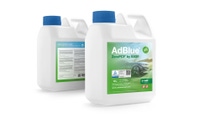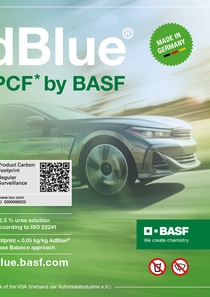Monomers
News release

March 26, 2024
AdBlue® ZeroPCF by BASF is launched on the market as the first AdBlue® product with reduced carbon footprint
- AdBlue® with a certified product carbon footprint of <0.05 based on a mass balance approach
- AdBlue® ZeroPCF by BASF helps customers to reduce their CO2 footprint
- PCF certification by TÜV and mass balancing according to REDcert2
BASF is now the first manufacturer to offer AdBlue® as a ZeroPCF variant with a certified CO2 footprint (product carbon footprint = PCF) of <0.05 kg per kilogram of AdBlue®. This value includes the amount of CO2 emitted in connection with the product during production up to the site gate (“cradle-to-gate”). The market standard for fossil products in Europe is at least 0.4 kg*.
The PCF reduction of AdBlue® ZeroPCF by BASF is achieved through the use of renewable energies and raw materials based on a mass balance approach and has been certified by TÜV Rheinland on the basis of ISO standard 14067:2018**. REDcert2, a certification system for biomass, also certifies that AdBlue® ZeroPCF by BASF meets the required mass balance specifications.
AdBlue® ZeroPCF by BASF is now available for industrial customers such as freight forwarders or the automotive industry as a tanker train product, enabling them to reduce their scope 3.1*** footprint. For end customers’ diesel vehicles, AdBlue® ZeroPCF by BASF is available in all standard packaging sizes, such as the five-liter canister.
“There is an increasing demand for products with reduced carbon footprint in the industries. With AdBlue® ZeroPCF by BASF, we offer an AdBlue® solution for the transportation industry that meets this trend. In the coming months, we will also continue to expand our portfolio of new sustainable products step by step,” explained Dr. Jens Aßmann, Vice President Nitrogen Based Chemicals & Amino Resins at BASF.
AdBlue® ZeroPCF by BASF is a further step on the sustainability roadmap of BASF’s Monomers division which was announced last year. This envisages developing at least one circular solution for every major product line by 2025. “Sustainable products are playing an increasingly important role in all customer industries. We support our customers in achieving their own sustainability goals with our broad portfolio of solutions with reduced PCF,” said Aßmann. The division’s sustainable offerings are an essential part of BASF’s path to climate neutrality and net-zero CO2 emissions by 2050.
Further information is available on the AdBlue® website.
* BASF has made these assumptions for corresponding third-party products on the basis of publicly available, fee-based information.
** BASF’s product carbon footprint (PCF) calculations follow the requirements and guidance given by ISO 14067:2018. In a methodology review, TÜV Rheinland has certified that the PCF methodology SCOTT developed and used by BASF SE for calculating the PCFs of BASF products is scientifically-based, is in accordance with ISO 14067:2018, and reflects the state of the art (ID-Nr. 0000080389: BASF SE - Certipedia).
*** Scope 3.1 = Emissions from purchased goods and services
AdBlue®
AdBlue® is a high purity, 32.5% urea solution directly injected into the exhaust gas where it serves as reducing agent. The released ammonia subsequently reacts with the nitric oxides on the catalyst to form elementary nitrogen and water; both are natural constituents of the air we breathe. Hence, the amount of nitric oxides in the emission can be reduced.
About BASF
At BASF, we create chemistry for a sustainable future. We combine economic success with environmental protection and social responsibility. Around 112,000 employees in the BASF Group contribute to the success of our customers in nearly all sectors and almost every country in the world. Our portfolio comprises six segments: Chemicals, Materials, Industrial Solutions, Surface Technologies, Nutrition & Care and Agricultural Solutions. BASF generated sales of €68.9 billion in 2023. BASF shares are traded on the stock exchange in Frankfurt (BAS) and as American Depositary Receipts (BASFY) in the United States. Further information at www.basf.com.


